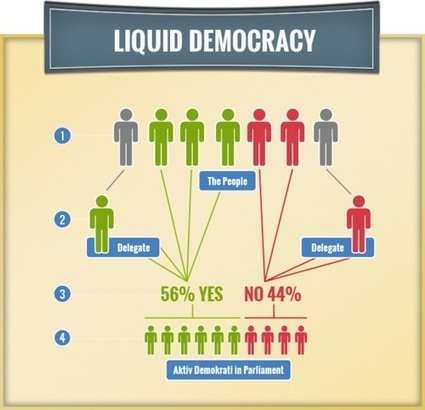 Your new post is loading...
“It’s some time now, therefore, that I wonder what it means to create a futureproof business, and recently I have often wondered if this is still a topic of interest. One thing that I pondered often lately is the trends related to S&P500 dynamism. If you look at the history of this index you find that, while in 1958 a company could expect to stay in the S&P for an average of sixty years, today the average number of years is decreased to 18 (and is decreasing regularly). So: what does it mean to prosper? Is it about having a long life? Is it about adaptability? And what about the brand when products become platforms?
This talk explores how high-tech non-profits are creating infrastructure and services for a peer-productive world.
Throughout the twentieth century, nation states cooperated to build global institutions to facilitate joint action and address global problems. Many of these organizations were created in the aftermath of WW II. In 1944, 44 Allied nations gathered in Bretton Woods, New Hampshire, to develop a series of commercial and financial relationships for the industrial world.
“This article deals with the phenomenon of hackerspaces and sheds light on the relationship of their underlying values, organizational structures and productive processes to those of the online communities of Commons-based peer production projects. While hackerspaces adopt hybrid modes of governance, this article attempts to identify patterns, trends and theory that can frame their production and governance mechanisms. Using a diverse amount of literature and case studies, it is argued that, in many cases, hackerspaces exemplify several aspects of peer production projects’ principles and governance mechanisms.”
This essay “decribes a Generative Systems Model : The “G5” – Five Generative Processes that “entail unique internal dynamics, give rise to unique types of structural organization, and operate in fundamentally different ways”. It would be interesting to explore how this model can help design patterns to generate and nurture commons, and how process narratives come in the picture in relation to generative processes and action logics.”
Technological fixes to time-honoured problems are all the rage these days. Bitcoin is meant to fix money, social media are seen as an antidote to Rupert Murdoch and assorted tyrants, networked robots are to help countries like Japan deal with demographic declines etc. Perhaps the largest claim is that the Internet has helped (or is about to help) democratise capitalism. Ten years ago that claim struck me as both fascinating and dubious. So, I sat down and wrote an article about it (circa 2004). Its gist: The Internet is a wonderful leveller. But democracy requires a great deal more than mere ‘levelling’. Primarily, it requires political institutions that enable the economically weak to have a decisive say on policy against the interests of the rich and powerful. Ten years later, I am re-visiting this question, under the shadow of a global crisis that made it even harder to convert an e’Demos into genuine e’Democracy. What follows is an updated version of the original paper.[1] (Click here for a pdf version or just read on.)
In a moment of clarity, Gro became famous for this overstatement, which is nevertheless true in its essence. Through human battles over truth, artificial walls are built between nature, culture and individuals. A holistic view of knowledge is now becoming an essential requisite for finding global solutions to the many threats humanity faces in the coming decades. The ecosystems upon which we are dependent have real limits, which they are approaching, or have already passed in many areas. No personal or public opinions can change these facts. All technologies have to operate within the laws of nature. One of these laws is that humanity needs functional ecosystems to exist. Geoengineering, consisting of attempts to save global-sized ecosystems with large construction projects, is presently science fiction and will remain so in the near future. Life must reproduce and replenish resources to meet our basic needs, i.e., food, shelter, air, water, fibre and soil. Every human is a part of ecosystem cycles, and every part of the human body is a result of evolution. We have known this for quite a long time now. Thus, why are we still headed towards collapses? Why are we living as if we were the last persons to be alive? What is the reason for not handing over a safe, sustainable and well-organised Earth to the next generation? Answers to these questions are now emerging from within our own psyche.
“Beyond the benefits of costs and elasticity, little attention has been given to the real power of mesh networking: the social impact it could have on the way communities form and operate.
“The first line of Satoshi Nakamoto’s white paper reads as follows: “A purely peer-to-peer version of electronic cash would allow online payments to be sent directly from one party to another without going through a financial institution.” The goal is achieved quite simply by removing three frictions to the exchange of value among people.
“Sovereign nation states have conspicuously failed to cooperate well enough to deal with increasingly global problems such as climate change, environmental degradation, and organized crime, Barber said. Nations focus on their borders, which are seen as competitive zero-sum games.
Slavoj Zizek, making a lot of sense as usual. Watch the video here:
The first line of Satoshi Nakamoto’s white paper reads as follows: “A purely peer-to-peer version of electronic cash would allow online payments to be sent directly from one party to another without going through a financial institution.” The goal is achieved quite simply by removing three frictions to the exchange of value among people.
If we want the city to produce a different outcome, it will take a different kind of organisation running it, responsible for it. The very idea of the city as a public good fundamentally rests on this. And the very idea of the sustainable city relies on understanding that the city is a public good.
|
First, the bad news. Our global community no longer has the luxury of putting off its complex problems till a later time. Mounting data on Earth’s atmosphere confirm what is already known in daily life: the planet is warming and water is becoming less accessible.
Heather Marsh is a human rights and internet activist, programmer, political theorist, and former Editor in Chief at Wikileaks Central, and the author of Binding Chaos , a compelling blueprint for 21st century governance. An excerpt:
As any cynic will confirm, money and law have a lot in common. But their ties run even deeper than most suspect. Money and law had similar origins: both arose spontaneously out of the undirected actions of individuals seeking common standards for mutual coordination. Money and law developed in parallel fashion, too: medieval Europeans enjoyed competition in currencies and legal systems until monarchies took over both fields. And state monopolies in money and law now present common hazards: they are imposed by fiat, inefficiently operated, and (as the cynics point out) jointly corrupting. However, a new generation of scholars has come to question the need for state monopolies in money and law. In the place of central banks they advocate a free banking system. In the place of state legal systems they advocate overlapping private jurisdictions in free and open competition -- a polycentric legal system.
“The most relevant among possible changes is demolishing our political system, based on domineering parties and on lifetime careers of lousy politicians. The way to achieve their annihilation is shifting from elections to sortition. Elections were and are for oligarchy. Sortition shall be again the ultimate way to enfranchise the people, as it was in the city-states of the Athenian system.
What do I mean? I mean that distributed autonomous corporations and organizations are the next step in Blockchain evolution. The digital currency revolution is moving beyond currency and into evolving the nature of governance.
“Property-owning democracy is unfamiliar and not well-understood, but it is a promising ideal for progressive political economy. In this very instructive, wide-ranging, and most welcome volume, Martin O’Neill and Thad Williamson have assembled fourteen thoughtful essays and a substantial introduction which together explore its meaning and history, and the prospects of its implementation. The book has a great deal to interest political philosophers and theorists, political scientists, political economists, and reflective political activists on the left. The essays are accessibly written, and the economics that is included is not mathematically demanding. As with any collection on an unfamiliar topic, a review of this one requires the provision of considerable background. The book is not primarily about Rawls. But its sub-title is “Rawls and Beyond” and it takes Rawls’s treatment of property-owning democracy as its touchstone and starting point. And so to appreciate this book, we need to see what Rawls meant by “property-owning democracy” and why he concluded in Restatement that either it or what he called “liberal socialism” “seem[s] necessary” to realize his conception of justice.[3] I shall therefore explain what Rawls had in mind while engaging and commenting on a number of the essays in O’Neill and Williamson’s collection.
Liquid Democracy is a fast, decentralized, collaborative question-answering system, which works by enabling chained answer recommendation. It occupies the middle ground somewhere between direct and representative democracy, and is designed to ensure that the things we all hold in common stay properly maintained (by small, stealthy, distributed teams of anarchist kung-fu badasses, if need be), even in the face of radical technological change.
The internet is weak, yet we keep ignoring that fact. Which is why I believe it’s time to reconsider the potential of mesh networking, and make mesh networks a reality.
“Throughout history, in numerous places and various eras, there are moments like 19 and 20 December 2001 in Argentina, when the ways in which we see things drastically change: something occurs that allows our imagination to open up to alternative ways of seeing and being, opening cracks in history (Zapatistas). These openings can come from any number of places, from natural disasters to rebellions, strikes, and uprisings.
“Effective use of the Internet holds the potential to benefit everyone. Currently, however, its benefits are distributed unequally — some people gain power, wealth and influence from using the Internet while others struggle for basic access. Our vision is a technical, interactive and information rich Internet platform on which people in their communities and elsewhere – the poor and marginalized in Developing and Developed countries, women and youth, indigenous peoples, older persons, those with disabilities–are able to develop and exercise their civic intelligence and to work together equitably and effectively to address our multiple individual and collective challenges.
‘A commons regime takes steps to protect the “resource” that the commons jointly manages/owns/cares for. More specifically the words “protecting the resource” means setting an absolute scale limit on its use. The commoners will set a scale of use for grazing a commons, or fishing a river, or taking water from an irrigation system. That is to say they set a maximum physically measured use – so many cows over the summer, so many gallons or water, so many fish per season. (NOT, so much $ worth of milk etc)
Communitarian movements attract to themselves many if not most of the new and progressive ideas of the times, often developing them into aspects of culture which then influences change within the dominant culture. Those ideas may arise in the dominant culture, or may be adapted from indigenous tribal cultures, or from foreign cultures, or from within the intentional community movement itself. From where ever the ideas come, in community they are developed in the context of small-scale human society, with relevant or appropriate versions of the cultural innovations then disseminated to the dominant culture as they prove to be viable. In this way intentional communities serve as “crucibles of culture,” or as Corinne McLaughlin and Gordon Davidson wrote in 1986 in their book, Builders of the Dawn: Community Lifestyles in a Changing World, as “research and development” societies, providing along with their criticisms of the dominant culture many constructive solutions to problems of the “outside world.” (McLaughlin and Davidson, p. 40)
|
 Your new post is loading...
Your new post is loading...





![[Guest Post] Thanks to the Internet, self-organised civic networks are challenging global agendas | | Peer2Politics | Scoop.it](https://img.scoop.it/u_4N6lG1ltAy-sasIttxyzl72eJkfbmt4t8yenImKBVvK0kTmF0xjctABnaLJIm9)


















